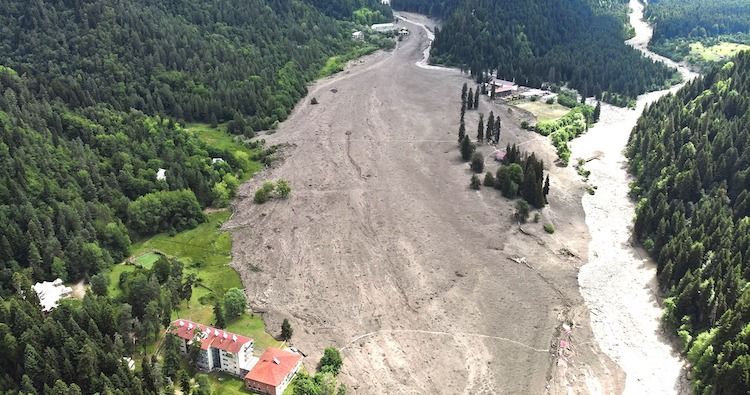GEORGIA
Glacier melting, erosion, heavy rains causes of Shovi resort landslide - National Environmental Agency preliminary report

The landslide in the western Georgian municipality of Oni that killed at least 18 people in the Shovi resort on August 3 was caused by intense melting of glaciers, collapse of rock formations in their headwaters, heavy rains, erosive processes and a glacier runoff, a preliminary report by the National Environmental Agency said on Monday, Azernews reports, citing Agenda.
The Agency said a collapse of a rocky mass on the western side of the Buba glacier had led to its collision with the glacier after coming into motion and caused a collapse of a part of the glacier. The body said the development may have caused an overflow of subglacial waters, with the resulting flow directed through the valley bed at a high speed in the locality.
The report said “erosion centres of different scales” were formed in “practically all tributaries” of the local Bubistskali river, with a solid flow forming in the upper part of the valley and supplemented with landslide masses washed along the river bed as well as debris moved from the tributaries.
A powerful mud and rock flow moved downstream from the bed and, in about 15 hours and 15 minutes, spread over about 26 hectares in the area of Shovi (the so-called ‘Cottage District’), where it covered buildings and caused human casualties”, it added.
The report also said the approximate volume of solid material that had come into motion in the river valley was about five million cubic metres, most of which entered the beds of Chanchakhi and Rioni rivers, with about 1.5 million cubic metres accumulated in the epicentre of the disaster and in the transit zone of the valley.
The report noted an analysis of the data of the existing hydrological station on the Chanchakhi river had shown no long-term stagnation of water in the valley, either before or during the development of the natural disaster.
It should also be emphasised that until August 3, 2023 there had been no significant flood flows in the bed of the Bubisskali River over the past 100 years”, the report pointed out.
The report also advised against carrying out “any kind of capital protective measures” in the area of the flood formation and transit zone in the river valley due to its “hydromorphological parameters”, and said it was “practically impossible to predict exact times of formation of these types of events in locations across the world”.
No comments:
Post a Comment